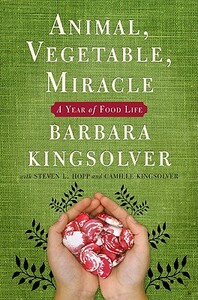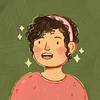You need to sign in or sign up before continuing.
Take a photo of a barcode or cover
I think Kingsolver meant well, I really do. However, this book came of as condescending and preachy. I had trouble finishing the book due to the "look at me" tone and the dismissal of others who aren't as fortunate but should be living the good life she is.
Great book choice, Connie! Don't worry, I won't be making my own cheese or raising chickens and turkeys (nor will I be stuffing my own turkey burger into 'casings')! This book has raised my awareness of how far some food travels to the local grocery store at the expense of the local farmer as well as the quality of the food itself. Olympia has a wonderful farmer's market. I plan to visit more often....worth the extra $$. I hear Top Foods buys produce locally. Worth checking out. Definitely a worthy read.
This book makes me rethink everything I know about eating. It inspired me to make changes.
hopeful
informative
inspiring
medium-paced
Excellent. Magical prose from start to finish. Sort of a closer-to-home, more emotional companion to Omnivore’s Dilemma, and I thoroughly enjoyed it.
I love Barbara Kingsolver's novels and this memoir was a really good read. Really made me think about where our food comes from, how I can try to shop for more local foods, hormone free, etc. I think it is amazing what she and her family did and don't know if I could live that way for a whole year. I will admit that I didn't finish the book. I felt that by pg 250 I had "gotten the point" and was ready to move onto a novel. But I would recommend this one!
As someone in my book club pointed out, this book was too preachy for my liking. I felt other books I have read on the subject such as Fast Food Nation, Mad Cowboy or In Defense of Food, did a much better job tackling the subject. I support the ideas of the book, I just did not connect with this one; maybe if I was into gardening I would have.
It was enjoyable to read about the gardening/farming efforts, but there is also a lot about US policies, which as a non American was a slog to read through, all relevant and informative but dry (and outdated at the time I read it). I can recognise Kingsolvers's skill at writing purely by the fact that I was genuinely interested and invested in the mating habits of Turkey's by the end of the book, something I never imagined happening. Over all I'm glad I read it and will revisit it for ideas and recipes in the future.
This book was very informative and thought provoking. Kingsolver raises good arguments for sustainable, small farming, for eating locally and organic, and for thinking a lot more about where our food comes from and what that means for our lives and the lives of our children. I tend to agree with her that the U.S. does not have a healthy food culture. We, generally speaking, do not care to know how our food is grown or where it comes from or even what is in it. This book has definitely opened my eyes to some of the things I've been putting into my body, and also the consequences of eating food out of season, food shipped across the continent, and foods from corporate farms. Kingsolver's persuasive writing will definitely change the way you eat.
Occasionally Kingsolver got pretty preachy, and I did raise a few eyebrows over the longing for the way things used to be -- especially as I was reading "The Seed Keeper" at the same time, which made me notice the missing Native American in Kingsolver's narrative.
But. Those points do not take away from the main point of how healthy eating local is for the environment, the economy, and your health. This book inspired me to do better (though I will still buy bananas
But. Those points do not take away from the main point of how healthy eating local is for the environment, the economy, and your health. This book inspired me to do better (though I will still buy bananas



